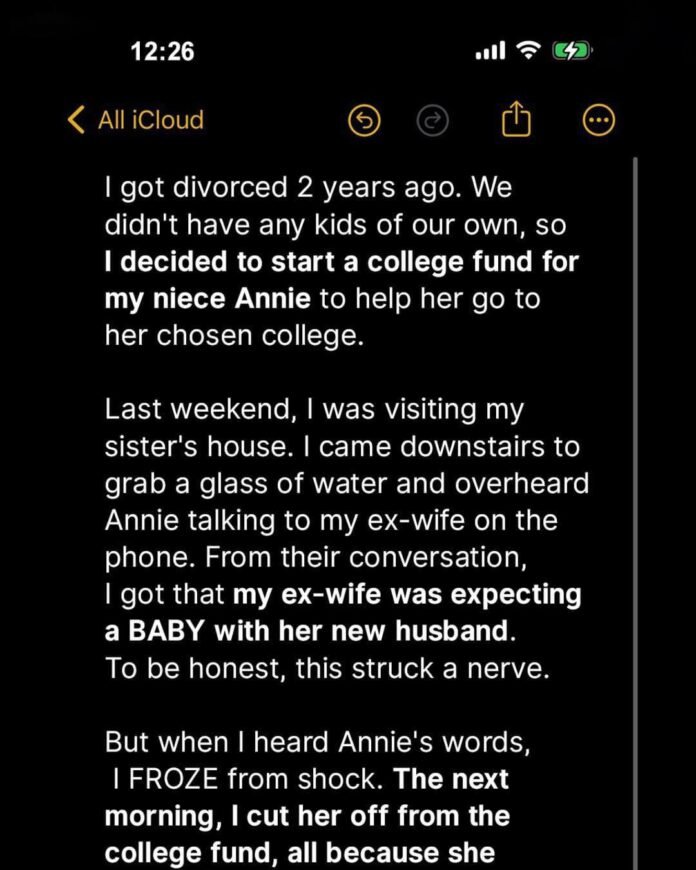Raymond arrives at a family reunion weekend scarred by his failed attempts at conception and his abandoned divorce.
However, an unforeseen run-in with his niece Annie over hurtful charges sends him plummeting into the abyss of familial devotion and introspection.
Hi there, this is Raymond. I am thirty-five years old, and I have always been the “family guy,” watching out for everyone. Due to infertility problems that my ex-wife, Darin, and I experienced two years after our divorce, I took comfort in helping my niece, Annie, who is like a daughter to me. In an effort to relieve her of one less stress when she heads off to her chosen college, I established a college fund for her in 2019. But everything changed during the last weekend.
I was at my mother’s house, where my sister, Jane, and Annie also reside, for my typical weekend. Although it was supposed to be a time of family togetherness, it ended up being something that might have permanently changed my relationship with Annie.
I was half asleep upstairs late on Saturday night, or early on Sunday morning, when I started to feel thirsty. My head was cloudy, and my thoughts were far away as I padded downstairs to the kitchen for a drink of water.
I heard Annie talking on the phone at that point. She was conversing with my ex-wife, Darin, not just anyone in general. I wasn’t too surprised because Annie and Darin remained excellent friends even after our relationship ended.
It was evident from the glimpses I managed to see that Darin was expecting a child with her new spouse. The news gave me a twisted feeling in my stomach, but Annie’s remarks stopped me cold.
“I told you so, I told you so,” she said again, a sting of vindication in her voice. “I’ve always known that Uncle Raymond is the issue. His frail manhood simply prevented him from admitting it.”
I stood there, hidden behind the staircase, with my heart thumping loudly in my ears. Annie went on, not realizing I was here. “He was too terrified to acknowledge reality. Being wise, you left him before it was too late.”
I went upstairs, leaving the glass of water there, feeling a mixture of shock, betrayal, and hurt that was almost tangible. I adored Annie as if she were my own, how could she say such things? And about something so unpleasant and intimately personal?
Later, my mom and Jane recognized something was wrong as I was about to depart, still shaken. I tried telling them what I had heard, but they persisted in wanting answers.
Jane attempted to minimize Annie’s silence and quit eating by claiming that Annie was merely a young child and was “spouting nonsense.”
Despite their objections, I couldn’t take it any longer and left; I emailed Jane afterwards to let her know how horrified I was by Annie’s remarks. I informed her that after this, I would be unable to continue paying for Annie’s schooling.
Jane responded back, stating Annie didn’t mean it and apologizing, but I couldn’t take it when her attempts to contact me were rejected. It was too much to bear to think of myself in the same room as someone who held me responsible for my own suffering.
Though the wound was too fresh, my mom tried to mediate, claiming Annie didn’t deserve to lose my support over this. Since then, I haven’t seen them. I find it difficult to talk about my own challenges, especially when they include something as delicate as infertility.
It was hard to admit that I was hurting badly enough to take Annie’s education fund out. My dad passed away in an accident when I was eleven years old, so I know the anguish of losing a parent at an early age. I love her very much.
To further complicate matters, my ex-wife and I shared the fertility problems, not just me. However, after Darin became pregnant, it appears that my family’s story has changed to place all the blame on me. It’s a difficult cross to bear, and I’m still getting used to navigating it without letting it win.
Following the fallout, the weeks dragged into the months, with a somber reflection added to every day. There was a gulf that felt impossible to cross between Annie and me; the air between us was heavy with unspoken words and unspoken feelings. Nevertheless, regret began to germinate in a sixteen-year-old girl’s heart, developing into a determination to fix what was damaged.
Annie’s self-reflection journey culminated in a straightforward yet meaningful act of penitence. She wrote me a letter, and in every word was her genuine remorse. She also made a scrapbook, which she kept next to the letter. It was a compilation of our shared memories, with every picture and ticket stub serving as a reminder of our relationship. It was a story of our common history, a palpable echo of love and laughter.
It was not simply the weight of the paper in my hands when she gave these marks of her regret to me; it was also the weight of her sincere wish to mend our division.
